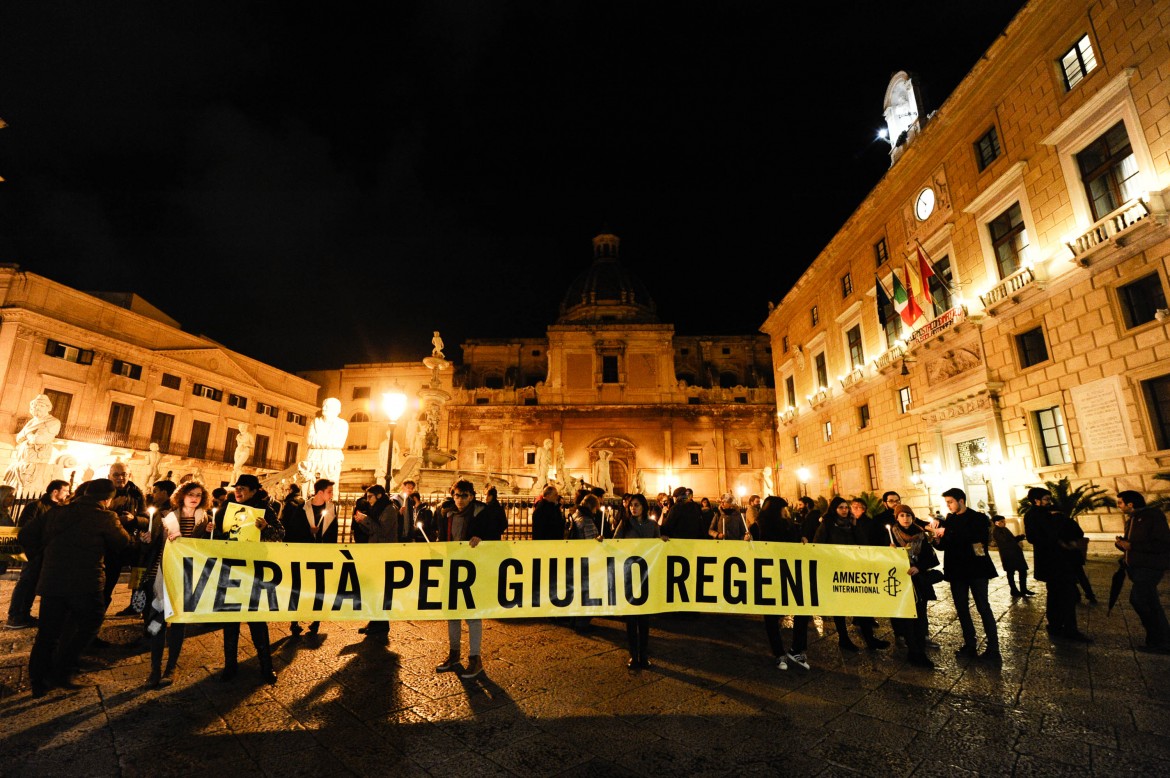Report
Regeni family: ‘The ambassador’s return to Egypt was a failure’
The Regeni family is demanding a reckoning. Five months after the Italian ambassador returned to Cairo, a move the government said would help the investigation, Giulio Regeni’s parents are demanding a new strategy.

Six months ago came the announcement of the return of the Italian ambassador to Cairo, and it has been five months since he officially took up his duties again. But there have been no new developments in the Regeni case, if we don’t count the delivery to Giulio’s family of the case file containing the results of the Egyptian investigation last December.
And now it is Giulio’s family who, on the occasion of Feb. 14 and the recurring social media campaign which has been taking place every 14th of every month since August, have spoken in no uncertain terms about a “failure”: the mission of the ambassador, Giampaolo Cantini, “should have allowed the discovery of the truth, from a legal point of view, regarding the myriad evils inflicted upon our son,” wrote Giulio’s parents in a statement.
“We believe that it is necessary to immediately change course, and demand, without further delay, a meeting between the two prosecutorial teams, which must result in the immediate delivery of the subway videos to the Italian side”—that is, the security camera recordings from Cairo’s subway system whose release the Italian Foreign Ministry had touted in August as the condition for the return of the Italian ambassador to Egypt.
It didn’t happen—two years after the events, there is still no trace of the recordings, nor is there any agreement on who is responsible for recovering the images on them. The videos have never been delivered to the Italian side, despite the repeated promise by the Egyptians to this effect that was reiterated on Aug. 14 by the attorney general, nor is any information known regarding the company which is supposed to be involved in their recovery.
And furthermore, there is yet another obstacle from the Cairo side: the absence of any reaction to “the Italian memo that reconstructs the exact responsibilities of nine precisely identified Egyptian law enforcement officials.” This is why it is also necessary, according to Giulio’s parents, to “establish a joint investigative strategy regarding these nine people who have been already identified as responsible by our investigators and prosecutors. Only then will the presence of the Italian ambassador in Cairo not show all the signs of a surrender, but will instead acquire the dignity of a call for justice, and possibly a successful one.”
“We feared that this gesture would be interpreted as an unconditional surrender by the powers that have annihilated Giulio and that have hidden the truth with impunity for the past two years,” the statement continues. ”And, indeed, Ambassador Cantini hardly had enough time to take up his duties before the Egyptian authorities, emboldened by this “normalization of relations,” went on to take down the website of ERCF, the NGO to which our Egyptian consultants belong; arrested the attorney Ibrahim Metwaly at the airport, who was on his way to Geneva on an invitation by the UN to give a report on enforced disappearances and Giulio’s case; and issued a search warrant for ERCF, and attempted to shut it down altogether.”
A common thread connects the goals and the instruments of the institutional machinery of repression which is silencing young journalists (the latest of the “disappeared,” Hassan al-Banna and Mustafa al-Aasar, vanished on February 3), which has held the photojournalist Mahmoud Abu Zeid in prison for the past four years, guilty of having witnessed the massacre of thousands of supporters of the Muslim Brotherhood in Rabaa in August 2013 (and whose trial was postponed yesterday for the 48th time), and which is imprisoning the leaders and spokesmen of the opposition (only yesterday, Hisham Genena was arrested, the former head of the Egyptian Central Auditing Organization who led the failed election bid of Sami Anan, a general who tried to run for president).
Giulio was caught in the same web, as he was in Egypt to do research on independent trade unions, which arose out of the Tahrir Square revolution and which are a thorn in the side of al-Sisi’s regime, established by coup. It is exactly as Italian prosecutor Pignatone said in a letter to the press on Jan. 25: “Giulio was killed because of his research, and the role of the secret services in this is certain.”
None of these certainties can penetrate the wall erected by President al-Sisi. In late January, as he was standing next to Descalzi, the CEO of ENI, at the inauguration of the Zohr natural gas field, he again reiterated the (feigned) willingness by the authorities in Cairo to cooperate. He is fully aware that there will be no retribution coming, and that the political and economic interests are more than powerful enough to bury the truth for Giulio and the millions of Egyptians trapped by a repressive and dictatorial regime.
The Regeni family is demanding a reckoning, from both the Italian government and from Cantini himself, who on Sunday, in a meeting with Egyptian Prime Minister Ismail, again called for “definitive results” in the Regeni case, after having spent the last five months forging all kinds of agreements and striking up new partnerships with the Egyptians.
A few days earlier, on Feb. 8, the case was brought again to attention in Europe, as the European Parliament passed a resolution reiterating its demand for truth that had been the object of a previous resolution on March 2016, this time denouncing “the absence of progress in the investigation” and expressing “outrage at the torture and murder of Giulio Regeni.”
Originally published at https://ilmanifesto.it/famiglia-regeni-il-rientro-dell-ambasciatore-in-egitto-un-fallimento/ on 2018-02-14
